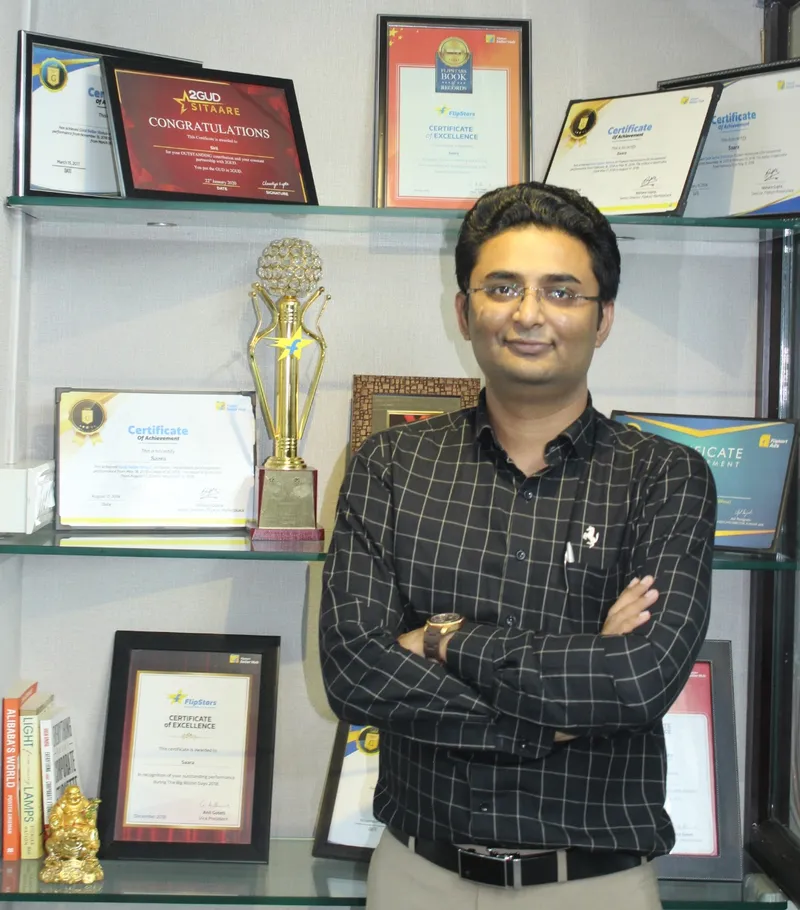1575367080560.png)
Flipkart
View Brand PublisherA 24-year-old Hiren Lathiya believed the future was e-commerce. Six years later, on Flipkart’s Big Billion Day Sale 2020, his brand earned Rs 1 cr in just 7 days
Hiren Lathiya’s Indian wear fashion apparel brand, Leemboodi, earned Rs 1 crore in revenue during Flipkart’s Big Billion Days Sale this year — a 2.5x increase from last year. “For the last few years, we have witnessed an increase of 2-2.5x sales compared to the previous year during every Big Billion Days sale. This year too was no different. This has been a big motivator and has made us ambitious and optimistic about our business growth,” shares Hiren.
However, there was one key difference this year. Due to the pandemic and the challenges to ensure the safety of its employees, they couldn't work round-the-clock as they did in previous years. “We were able to work for just about 15 hours a day during the sale period. However, we were at our productive best and learned better time and resource management. We also followed all the mandatory safety measures such as temperature checks every three hours, social distancing and proper sanitisation.” The teamwork, coupled with the increased business visibility because of the sale, ensured that Hiren was able to sell 80 percent of his inventory in just seven days.
The 30-year-old likes to call Leemboodi a youngster’s company. “The average age of our employees is 28 years. And, we are a 100+ member strong team. So the energy and enthusiasm are always high. And, to ensure that we make the most of Big Billion Days, we begin the preparation much ahead of time.” The team regularly has meetings where they are assigned tasks based on predefined roles. “And, on hectic days, we help each other to reduce the workload. There are days when I am packaging the orders and not just planning the business strategy. I believe I just represent the company. I am not the owner,” he adds.
It was in 2014, that Hiren took the leap into entrepreneurship after completing his Masters in Business Administration, working as a financial advisor and then moving to lead a team at a B2B marketplace. “I was 24-years-old and the youngest to lead a team,” shared Hiren. During his work at the marketplace, Hiren realised the potential of e-commerce and understood the workings of the textile sector in-depth. The potential of e-commerce and the opportunity it presents for textiles catapulted Hiren to start Leemboodi - an ethnic wear brand.
The growth hack: coupling local market strength with Flipkart’s nation-wide customers
By being based in Surat, which is also known as India’s textile hub, Hiren realised he could leverage the inherent strength of the local market to build his brand. “At the same time, I was confident that the future was online. And, in India, e-commerce and Flipkart are synonymous with each other, given their market coverage and brand acceptance. So, I knew I had to launch the business on Flipkart on Day 1.”
Launching on Flipkart, Leemboodi began to witness gradual steady growth. “In a span of just three months, we began catering to 100 orders a day. It was huge for a brand that was almost non-existent 100 days ago.” The country-wide customer reach was instrumental in enabling the young brand to reach out to a wide audience. “The other key element was the market and business analysis which we received from the Flipkart team. It became the lifeline of our business strategy. We have in fact leveraged this resource to the maximum. It also helped that the account managers at Flipkart constantly push you to achieve more growth.”

Hiren Lathiya
The timely issuance of payments from the e-commerce platform has been vital in ensuring that businesses don’t face a cash crunch due to default on the payment timelines, which is often the case while running offline businesses. “I have seen how offline businesses constantly worry and wait for the payments to hit their account as delays often affect cash flows and thereby hinders business growth. When you are working with Flipkart, the issue is absent. With timely payments, we are able to focus on driving business growth and not waste time following up or waiting for the money.”
All of this has helped Leemboodi grow. “I started with a single table and now I have a 30,000 sq. ft. warehouse in Surat along with Flipkart’s warehouses in all 4 regions stocked with our products. This is our business’ biggest strength — a wide inventory stock.”
Steering the next big leap in growth
While Leemboodi began with retailing sarees and fabrics and focused on it for the first three years, the venture expanded its product portfolio to include Kurtas and Dupattas. “Sarees continue to be a major growth driver. It is our best selling product. We have internet textile engineers who ensure a thorough quality check, and never compromise on the quality standards.”
While some of the products are manufactured in-house, some of them are sourced and manufactured by external mills as well where they provide their design and fabrics to an independent mill to manufacture some of the products. The venture also has dedicated suppliers who sell their products exclusively. And, just seven months ago, Hiren launched a western clothing line called Selvia, which has made it to the top 20 brands in the western clothing category on Flipkart. “The first five years have all been about understanding e-commerce dynamics, building a brand, streaming operations, and building our capacity to grow. We are now looking to expand our business across categories. We want to grow 10x in the next five years.”
Reflecting on his career as an entrepreneur, he says, “During my college days, when someone asked me where I saw myself ten years down the line, I would tell them that I see myself running a huge business with more than 100 employees. And, here I am, living by those very words.”








